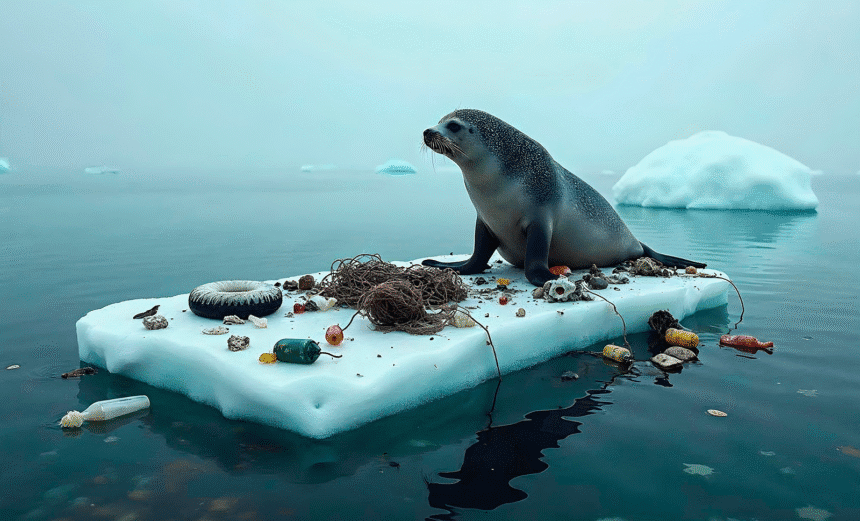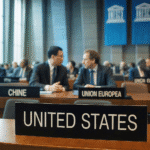A new front in the global battle against plastic pollution has opened in Geneva, where world leaders, corporate giants, and climate-vulnerable nations have converged to hammer out what could become the most ambitious environmental treaty since the Paris Agreement. The resumed Intergovernmental Negotiating Committee session (INC‑5.2) seeks to finalize a legally binding pact to curb plastic pollution across its entire life cycle from raw material extraction to disposal.
The stakes are high: with plastic waste projected to nearly triple by 2060, and its health and environmental toll mounting, the outcomes of these two weeks of negotiations (scheduled to run through 14 August) may define the global response for decades to come. The session follows a collapsed effort in Busan in late 2024 and could be the last opportunity to unify divergent visions into a single, enforceable treaty.
Deep Divides: Production Caps vs. Downstream Focus
A fundamental divide underscores the talks: over 100 countries, including the European Union and small island states, demand enforceable limits on virgin plastic production, a position supported by leading corporations like Coca‑Cola, Nestlé, and Walmart. They argue that without curbing production at the source, end‑of‑pipe solutions will be incapable of reversing escalating plastic volumes, projected to triple by 2060, according to The Guardian.
Opposing this, petrochemical‑producing nations, such as Saudi Arabia, Russia, Iran, the U.S, favor agreements focused on product design, recycling, and waste management rather than binding production limits. The U.S. under the Trump administration has rolled back environmental protections and explicitly resisted production caps, raising concerns over a diluted deal emphasizing downstream fixes, according to Reuters.
Health and Equity Stakes Intensify the Push
A new Lancet Countdown report, endorsed by 27 scientists and doctors, warns that chemical exposures from plastics cause diseases across age groups, including cardiovascular disease, cancer, and respiratory illness; BPA alone has been linked to over 400,000 deaths globally, and cumulative economic health damages reached $1.5 trillion across 38 nations. Scientific advocates stress that single‑use plastics—, for ~40% of production, must be sharply reduced.
Small island and low‑lying coastal states, whose economies and health are disproportionately harmed by marine plastic debris, are pressing for treaty provisions on financing, cleanup, and capacity building. As the AOSIS chair, Palau’s representative, warned, the treaty is likely their “last best chance” to protect human and ecological health.
Political Strategy and Procedural Flashpoints
Strategic disagreement is not limited to substance: India is advocating that decision‑making remain consensus‑based, cautioning against mechanisms that could override sustainable development concerns in low‑income countries. This reflects broader tensions around fairness, ambition, and procedural legitimacy.
Meanwhile, environmental groups like Greenpeace are ramping public pressure, calling for 75% production reductions by 2040 and warning that “we will never recycle our way out of this problem”.
Implications: A Treaty Will Shape Global Systems
Health, Environment, and Economics
A treaty with production limits would mark a major global shift, potentially slowing forecasted waste growth (OECD estimates over 1 billion tonnes of plastic waste by mid‑century) and alleviating climate‑ and biodiversity‑related risk. It would also mitigate serious human health burdens as detailed by new Lancet findings.
Industry and Innovation
Binding production caps would upend petrochemical‑driven business models and accelerate innovation in reusable, fiber‑based, or compostable alternatives, spurring shifts in packaging supply chains and consumer behavior.
Equity and Global Development
How finance and implementation support are structured will influence whether the treaty promotes climate‑health‑justice, especially for vulnerable countries facing cleanup costs, infrastructure gaps, and exposure to plastic hazards. Procedural decisions, consensus vs. vote, may determine the involvement and buy‑in of developing states.
Diplomacy and Governance
The talks amount to a test of multilateralism: whether meaningful consensus can be achieved under intense industry influence and geopolitical pressure. Commentators warn that false equivalence or revisionism, including denial of scientific consensus on health impacts, could weaken the outcome.
A Final Note: Why INC‑5.2 Matters
Geneva’s final fortnight of negotiations stands as a crossroads: success could result in a historic legally binding instrument that shifts the global plastics economy, protects health, and shores up climate resilience. Failure, or a watered‑down outcome, might condemn communities to a future where plastic waste continues unchecked, and nations continue to pay the environmental and health price of delay.
The path ahead hinges on whether negotiators from diverse quarters manage to bridge the gap between systemic ambition and vested interests, and whether developing nations see the outcome as enabling or restrictive of sustainable development.


















